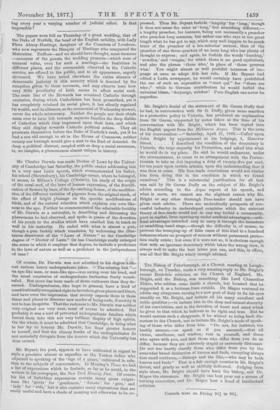Mr. Bryant, the poet, appears to have cultivated in regard
to style a precision almost as superfine as the Yankee ladies who objected to speaking of the legs of a piano,' cultivated in rela- tion to the subjects of conversation. In Monday's Times we had a list of expressions which he forbade, so far as he could, to the writers in his newspaper, the New York Evening Post. Of course his list of forbidden expressions contain many gross vulgar- isms like 'gents' for gentlemen," donate' for give,' and. 'lady' for 'wife,' but it also contains many expressions that are really useful and have a shade of meaning not otherwise to be ex-
pressed. Thus Mr. Bryant forbids lengthy 'for 'long,' though it does not mean the same as long,' but something different,— a lengthy preacher, for instance, being not necessarily a preacher who preaches long sermons, but rather one who says at too great length what he has got to say, which may well happen to be much truer of the preacher of a ten-minutes' sermon, than of the preacher of one three-quarters of an hour long who has plenty of thought to express ; and again, he forbids the words 'humbug,' 'rowdies,' and roughs,' for which there is no good equivalent, and also the phrase those who,' in place of 'those persons who.' You might almost as well prohibit terseness of lan- guage at once as adopt this last rule. If Mr. Bryant had edited a Latin newspaper, he would certainly have prohibited the use of such an expression as "aunt qui " for "there are who ;" while to German contributors he would forbid the universal idiom, derjenige, welcher.' Pure English can never be superfine.






































 Previous page
Previous page